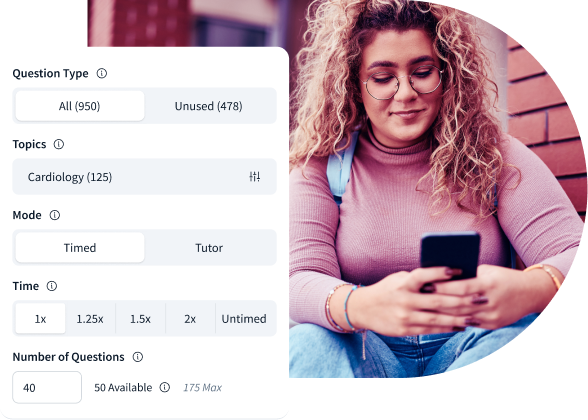Mastering AANP Exam Questions: Your Guide to Success The American Association of Nurse Practitioners (AANP) certification exam is a critical step for nurse practitioners looking to validate their expertise and earn the FNP-C (Family Nurse Practitioner-Certified) or AGNP-C (Adult-Gerontology Primary Care Nurse Practitioner-Certified) credential. Success depends not only on knowing the material but also on understanding the structure and style of AANP exam questions. Here’s everything you need to know to tackle these questions with confidence. 1. The AANP Exam Question Format The AANP certification exam consists of: The questions test your clinical knowledge and decision-making abilities, reflecting real-world scenarios in primary care settings. 2. Key Topics Covered on the AANP Exam The AANP exam blueprint focuses on the following domains: a. Assessment b. Diagnosis c. Clinical Management d. Professional Role Each domain is weighted differently, so refer to the AANP exam blueprint for detailed percentage distributions. 3. What Makes AANP Exam Questions Challenging? a. Real-World Application The questions often present clinical scenarios requiring critical thinking and decision-making. Memorization alone won’t suffice; you need to apply your knowledge to solve problems. b. Subtle Distractors Incorrect answer choices (distractors) are designed to appear plausible. Careful reading and attention to detail are essential. c. Prioritization and Best Practices Many questions ask you to determine the “most appropriate” or “best” action, emphasizing evidence-based care and priority setting. 4. How to Approach AANP Exam Questions a. Read Carefully Pay attention to keywords such as “initial,” “most likely,” or “best.” These indicate what the question is truly asking. b. Eliminate Distractors Narrow down your options by ruling out clearly incorrect answers. This increases your chances of selecting the correct response. c. Use Clinical Guidelines Base your answers on up-to-date clinical practice guidelines, such as those from the CDC, AAFP, or ACOG. d. Manage Your Time Allocate time wisely, ensuring you answer all questions. Don’t dwell too long on a single question—mark it and return later if needed. 5. Practice Makes Perfect a. Use Practice Question Banks Practice tests help you familiarize yourself with the question format and identify areas that need improvement. Look for high-quality question banks that mirror the AANP exam style. b. Review Rationales Understanding why an answer is correct or incorrect is just as important as answering the question itself. Focus on learning from your mistakes. c. Simulate Test Conditions Take full-length practice exams in a quiet environment with timed conditions to build stamina and reduce test-day anxiety. 6. Study Resources for AANP Exam Questions a. Recommended Books b. Online Practice Platforms c. AANP Practice Exams The AANP itself offers official practice exams, giving you insight into the actual test structure. 7. Test-Day Tips 8. Common Mistakes to Avoid Conclusion Mastering AANP exam questions requires a strategic approach that combines thorough content review, consistent practice, and test-taking skills. By familiarizing yourself with the question format and focusing on real-world clinical applications, you’ll be well-prepared to succeed. Start practicing today, and take one step closer to earning your AANP certification! Feel free to personalize your study plan with trusted resources and practice tools that work best for your learning style. Good luck!
ANCC PREP BOOK
The Ultimate Guide to Choosing the Best ANCC Prep Book Preparing for the American Nurses Credentialing Center (ANCC) certification exam is a critical step in advancing your nursing career. With the right study tools, you can build confidence, improve your understanding of key concepts, and maximize your chances of passing on your first attempt. Among these tools, ANCC prep books are an invaluable resource. Here’s everything you need to know about choosing the best ANCC prep book to help you succeed. 1. Why an ANCC Prep Book Matters ANCC certification exams, such as the Family Nurse Practitioner (FNP), Psychiatric-Mental Health Nurse Practitioner (PMHNP), or Adult-Gerontology Primary Care Nurse Practitioner (AGPCNP), test a broad range of knowledge and skills. Prep books are designed to: Investing in a high-quality prep book can significantly enhance your study experience. 2. Features to Look for in an ANCC Prep Book When selecting a prep book, prioritize the following features: a. Comprehensive Content Coverage Ensure the book aligns with the specific ANCC exam you’re taking. It should cover topics like health assessment, diagnosis, treatment planning, and professional practice guidelines. b. Practice Questions and Rationales A good prep book includes a variety of practice questions with detailed explanations for both correct and incorrect answers. This helps you identify knowledge gaps and understand key concepts. c. Exam Strategies Test-taking tips, such as time management and techniques for handling complex questions, can make a big difference on exam day. d. Clear Organization and Design Look for a book with well-organized chapters, clear headings, charts, and visuals. This makes it easier to absorb and retain information. e. Online Resources Some prep books offer access to additional materials, such as online practice exams, video tutorials, or interactive question banks, for a more engaging study experience. 3. Top ANCC Prep Books to Consider Here are some of the most recommended prep books for ANCC exams: a. “FNP Certification Exam Prep” by Leik b. “Psychiatric-Mental Health Nurse Practitioner Review Manual” by ANCC c. “Adult-Gerontology Primary Care Nurse Practitioner Certification Review” by Fitzgerald d. “ANCC Certification Review Manuals” by ANCC 4. How to Use an ANCC Prep Book Effectively a. Create a Study Plan Break the book into manageable sections and allocate time to each chapter. Focus on your weaker areas first. b. Practice Daily Dedicate time to answering practice questions and reviewing the rationales. Consistent practice builds confidence. c. Take Full-Length Practice Tests Simulate the real exam environment to assess your readiness and improve time management skills. d. Combine with Other Resources Use prep books alongside online question banks, video lectures, or review courses for a well-rounded preparation. e. Review and Repeat Revisit challenging topics and questions to solidify your understanding. 5. Common Mistakes to Avoid Conclusion The right ANCC prep book can be your ultimate study partner, providing the knowledge, strategies, and practice you need to excel on your certification exam. Take time to choose a book that fits your learning style and exam requirements, and use it consistently alongside other resources. With dedication and the right tools, you’ll be well-prepared to earn your ANCC certification and advance your nursing career.
ANCC FNP EXAM
Everything You Need to Know About the ANCC FNP Certification Exam The American Nurses Credentialing Center (ANCC) Family Nurse Practitioner (FNP) Certification Exam is a crucial milestone for nurse practitioners pursuing advanced practice credentials. Successfully passing the exam demonstrates your competence and readiness to provide primary care services to individuals across the lifespan. Here’s a comprehensive guide to help you understand, prepare for, and succeed in the ANCC FNP exam. 1. What Is the ANCC FNP Exam? The ANCC FNP Certification Exam is designed to test your knowledge and clinical expertise as a Family Nurse Practitioner. It evaluates your ability to assess, diagnose, and manage health conditions while promoting wellness in diverse populations. Passing the exam earns you the Family Nurse Practitioner-Board Certified (FNP-BC) credential, a respected title that underscores your professional capability. 2. Exam Format and Structure The ANCC FNP exam consists of: The questions assess your expertise in areas such as clinical management, health promotion, patient care coordination, and evidence-based practice. 3. Eligibility Requirements To sit for the ANCC FNP exam, candidates must meet the following criteria: 4. Key Exam Content Areas The ANCC FNP exam focuses on the following domains: Each area is weighted differently, so be sure to review the ANCC’s official exam blueprint for detailed guidance. 5. How to Prepare for the ANCC FNP Exam a. Review the Exam BlueprintThe ANCC provides a detailed exam content outline, offering insights into key topics. Use this as the foundation for your study plan. b. Utilize High-Quality Study ResourcesConsider using: c. Focus on Test-Taking StrategiesLearn to manage your time, eliminate incorrect answers, and interpret complex scenarios. d. Join Study GroupsCollaborating with peers can reinforce your understanding and provide moral support. e. Practice Self-CareDon’t forget to take breaks, eat healthily, and manage stress to stay sharp during your preparation. 6. Exam Day Tips 7. After the Exam 8. Why Choose the ANCC FNP Exam? The ANCC certification offers unique advantages: Conclusion The ANCC FNP Certification Exam is a pivotal step in your journey as a Family Nurse Practitioner. By understanding the exam structure, leveraging effective study strategies, and maintaining focus, you can achieve the FNP-BC credential and take your career to the next level. Ready to start your preparation? Dive into trusted resources and create a study plan today. Your future as an FNP-BC is within reach!
AANP CUSTOMER SERVICE
Enhancing Customer Experience with AANP’s Outstanding Customer Service Customer service is often the defining factor in building trust and loyalty, and the American Association of Nurse Practitioners® (AANP) has set a high standard in this regard. Whether you’re a seasoned member or someone exploring the benefits of joining the association, AANP ensures your experience is seamless, personalized, and supportive. Here’s a look at what makes AANP’s customer service exceptional and how it continues to enhance the value it provides to members. 1. Efficient and Knowledgeable Support AANP’s customer service team is well-versed in the diverse needs of its members. Whether it’s answering questions about membership benefits, assisting with continuing education (CE) courses, or resolving account issues, the team is quick to provide accurate and comprehensive information. Members often commend AANP for its responsiveness and the team’s ability to navigate complex inquiries with ease. 2. Multi-Channel Accessibility Recognizing the varying preferences of its members, AANP provides customer support across multiple channels, including: This multi-faceted approach ensures that no matter how you prefer to communicate, AANP has a solution. 3. Tailored Support for Nurse Practitioners As the largest professional membership organization for NPs, AANP understands the unique challenges and opportunities within the profession. This insight allows their customer service representatives to provide context-specific support, from helping members access CE resources to guiding them through policy advocacy initiatives. 4. Timely Resolution of Issues A hallmark of great customer service is the ability to resolve issues efficiently. AANP’s team is dedicated to quick turnaround times, ensuring that members can continue to focus on their professional growth without unnecessary delays. 5. Proactive Member Engagement Beyond addressing immediate needs, AANP’s customer service excels in anticipating potential concerns. Members are regularly informed about: This proactive approach keeps members engaged and up-to-date, enhancing their overall experience with the organization. 6. Commitment to Feedback AANP actively seeks member feedback to improve its services. Whether through surveys, event evaluations, or direct interactions, the association uses this input to refine its processes and better align with member expectations. 7. A Culture of Care At its core, AANP’s customer service reflects the compassionate and professional ethos of nurse practitioners themselves. Members are not just treated as customers but as vital contributors to the NP community. This culture of care creates a sense of belonging and mutual respect that sets AANP apart. Conclusion AANP’s commitment to exceptional customer service mirrors its dedication to supporting nurse practitioners in their professional journeys. By providing efficient, accessible, and empathetic support, the association ensures that its members can fully benefit from the resources, advocacy, and opportunities it offers. For nurse practitioners considering membership or those looking for enhanced professional support, AANP’s customer service is just one of the many reasons to join this vibrant community.
ANCC CEU LOGIN
Navigating the ANCC CEU Login: A Quick Guide for Nurses Managing your continuing education units (CEUs) through the American Nurses Credentialing Center (ANCC) is a vital part of maintaining your professional certification. The ANCC CEU login portal allows you to track, upload, and manage your CEU credits with ease. Here’s everything you need to know about accessing and utilizing the ANCC CEU login system. What is the ANCC CEU Login? The ANCC CEU login is an online portal where nurses can: This system ensures your professional records are organized and accessible for certification renewal or audits. How to Access the ANCC CEU Login Logging Your CEUs Tips for Using the ANCC CEU Login What If You Can’t Log In? Benefits of the ANCC CEU Login System Staying on top of your CEUs is crucial for maintaining your nursing certification and continuing professional development. By mastering the ANCC CEU login portal, you can make the process simple and stress-free.
ancc practice questions
ANCC Practice Questions: How to Prepare for Your Certification Exam Preparing for an ANCC certification exam can be challenging, but utilizing practice questions is one of the most effective ways to succeed. Practice questions help you understand the exam format, identify knowledge gaps, and build confidence. Here’s a guide on how to make the most of ANCC questions. Why Use ANCC Practice Questions? Where to Find ANCC Practice Questions Tips for Using ANCC Questions Effectively Sample ANCC Practice Questions Question 1: Clinical Scenario A patient with a history of diabetes presents with a wound that has not healed after four weeks. Which is the most appropriate next step in management?a) Prescribe oral antibioticsb) Refer to a wound care specialistc) Order a culture and sensitivity testd) Increase the patient’s insulin dose Answer: c) Order a culture and sensitivity test. Question 2: Ethics and Policy A nurse practitioner is asked to prescribe a medication off-label. What is the primary consideration before proceeding?a) The cost of the medicationb) Evidence supporting the off-label usec) Whether the patient’s insurance will cover itd) Approval from a supervising physician Answer: b) Evidence supporting the off-label use. Key Takeaways
ancc certification renewal
How to Renew Your ANCC Certification: A Step-by-Step Guide Renewing your American Nurses Credentialing Center (ANCC) certification is essential for maintaining your credentials and continuing your professional journey. Here’s a comprehensive guide to help you navigate the process seamlessly. Why Renew Your ANCC Certification? Renewing your certification ensures you stay updated with current nursing practices and standards, validates your expertise, and demonstrates your commitment to professional growth. Most certifications are valid for five years, so planning ahead is crucial. Steps for ANCC Certification Renewal 1. Review Renewal Requirements Each ANCC certification has specific renewal criteria. These often include: Check the requirements for your specific certification on the ANCC website. 2. Track Continuing Education (CE) Credits Ensure you have completed the required CE credits within your certification cycle. ANCC accepts: Save certificates of completion or transcripts as proof. 3. Log Professional Development Activities Engage in activities like: 4. Verify Clinical Practice Hours (if applicable) Some certifications require proof of clinical practice hours within your specialty. Ensure documentation is signed by your employer or supervisor. 5. Submit Your Application You can apply for renewal up to one year before your certification expires. 6. Complete the Self-Assessment Some certifications require completing a competency-based self-assessment as part of the renewal process. Check if this applies to you. 7. Await Approval After submitting your application, the ANCC will review your materials. The approval process typically takes a few weeks. You’ll receive an email confirmation once your renewal is complete. Tips for a Smooth Renewal Process What If Your Certification Lapses? If your certification expires, you may need to meet additional requirements, such as retaking the certification exam. Avoid this by staying proactive about renewal deadlines. Renewing your ANCC certification is an opportunity to reflect on your accomplishments and ensure you stay at the forefront of your specialty. By following these steps, you can maintain your credentials and continue to provide excellent care.
can a us trained nurse pratitioner work in canada?
Can a US-Trained Nurse Practitioner Work in Canada? As the healthcare system continues to evolve, many nurse practitioners (NPs) from the United States are exploring the possibility of working in Canada. Given the similarities in the role and training, the question arises: Can a US-trained nurse practitioner practice in Canada? The short answer is yes, but there are specific requirements, processes, and regulations that must be followed. In this blog post, we’ll explore the steps US-trained NPs must take to work in Canada, the challenges they may face, and the opportunities that await them in the Canadian healthcare system. Understanding the Role of Nurse Practitioners in Canada In Canada, nurse practitioners are advanced practice registered nurses (APRNs) who have completed graduate-level education and training. They are authorized to perform a wide range of tasks, including: However, each province and territory in Canada has its own regulatory body for nurse practitioners, and the scope of practice can vary depending on where the NP works. Can a US-Trained Nurse Practitioner Work in Canada? Yes, a US-trained nurse practitioner can work in Canada, but there are certain steps they need to follow to obtain licensure and meet the regulatory requirements. The process includes: Challenges for US-Trained NPs in Canada Opportunities for US-Trained NPs in Canada Despite the challenges, there are many opportunities for US-trained nurse practitioners in Canada. The Canadian healthcare system values the advanced training and clinical experience that NPs bring, and there is a growing demand for healthcare professionals, particularly in underserved rural and remote areas. Conclusion US-trained nurse practitioners can work in Canada, but they must navigate the licensing process, meet certification requirements, and potentially adapt to different healthcare practices and regulations. While the process may be complex, Canada offers a rewarding environment for NPs, with opportunities for career growth, competitive salaries, and a strong emphasis on work-life balance. If you’re a US-trained NP interested in working in Canada, researching the specific requirements for the province you’re interested in and starting the credentialing process early are key steps to ensure a smooth transition.
np pharmacology qbank
Mastering NP Pharmacology with Qbanks: A Comprehensive Guide Pharmacology is a cornerstone of any nurse practitioner (NP) program, and excelling in this subject is crucial for success on board certification exams and in clinical practice. One of the most effective tools for mastering pharmacology is a question bank (Qbank). In this blog post, we’ll explore what NP pharmacology Qbanks are, why they’re essential, and how to make the most of them. What is an NP Pharmacology Qbank? A pharmacology Qbank is a collection of practice questions specifically designed to test and enhance your understanding of pharmacological concepts. These resources are tailored for NP students and include questions on: Most Qbanks are available online or through dedicated apps, offering interactive formats and instant feedback. Why Use a Pharmacology Qbank? Features to Look for in a Good NP Pharmacology Qbank Top NP Pharmacology Qbanks Here are some popular and well-regarded Qbanks for NP pharmacology: Tips for Using a Pharmacology Qbank Effectively Conclusion A pharmacology Qbank is an invaluable resource for NP students. By offering a structured way to review and apply knowledge, Qbanks can help you build confidence, master complex concepts, and excel in your exams. Invest in a high-quality Qbank, use it consistently, and watch your pharmacology expertise soar! Have you tried using a pharmacology Qbank? Share your experiences or favorite Qbanks in the comments below
can a nurse practitioner open a clinic in the usa ?
Can a Nurse Practitioner Open a Clinic in the USA? Nurse practitioners (NPs) are increasingly stepping into entrepreneurial roles within the healthcare system, including opening their own clinics. However, the ability to do so varies depending on state laws, scope of practice regulations, and other factors. This blog post explores the conditions under which NPs can open a clinic in the U.S. and the steps involved in making it happen. Understanding Scope of Practice The scope of practice for nurse practitioners is determined by state law and falls into three categories: Steps to Open a Clinic as a Nurse Practitioner Benefits of NPs Opening Clinics Challenges to Consider Conclusion Yes, nurse practitioners can open their own clinics in the U.S., but the feasibility depends on the state’s scope of practice laws. With the right preparation, determination, and adherence to regulations, NPs can create thriving clinics that benefit their communities and enhance their careers.









